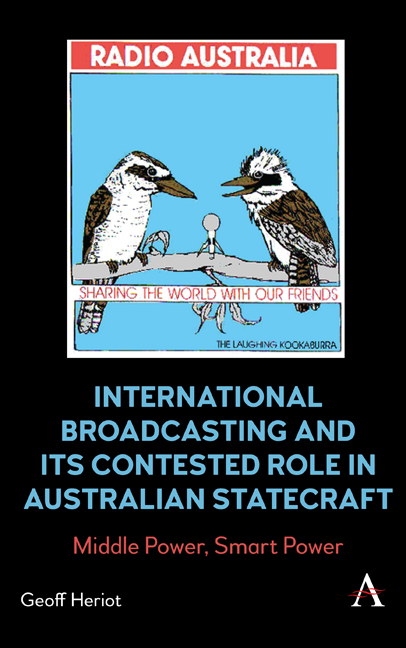 International Broadcasting and Its Contested Role in Australian Statecraft
International Broadcasting and Its Contested Role in Australian Statecraft Book contents
- Frontmatter
- Dedication
- Contents
- List of Figures
- Foreword
- Acknowledgements
- Chapter One Introduction
- Chapter Two Media and the Contest of Ideas
- Chapter Three International Broadcasting and Its Discursive Properties
- Chapter Four Mobilising ‘Softer’ Power in a Hard World
- Chapter Five Australia’s ABC: State Interests, National Evolution
- Chapter Six Purpose, Performance and Evaluation
- Chapter Seven Modernising the ABC
- Chapter Eight Policy, Priorities and Qualified Independence
- Chapter Nine Engaging with Intercultural Audiences
- Chapter Ten Indonesia, the Crucible
- Chapter Eleven Strategic Contingency and War
- Chapter Twelve Looking to the New Disorder
- Index
Chapter Six - Purpose, Performance and Evaluation
Published online by Cambridge University Press: 15 November 2023
- Frontmatter
- Dedication
- Contents
- List of Figures
- Foreword
- Acknowledgements
- Chapter One Introduction
- Chapter Two Media and the Contest of Ideas
- Chapter Three International Broadcasting and Its Discursive Properties
- Chapter Four Mobilising ‘Softer’ Power in a Hard World
- Chapter Five Australia’s ABC: State Interests, National Evolution
- Chapter Six Purpose, Performance and Evaluation
- Chapter Seven Modernising the ABC
- Chapter Eight Policy, Priorities and Qualified Independence
- Chapter Nine Engaging with Intercultural Audiences
- Chapter Ten Indonesia, the Crucible
- Chapter Eleven Strategic Contingency and War
- Chapter Twelve Looking to the New Disorder
- Index
Summary
Having established the function and properties of international broadcasting as discursive power, I propose a framework for evaluating its functions, performance and efficacy as a practice of statecraft. A broadcaster’s performance evaluation commonly will include measures of its efficiency and its effectiveness. The question of efficiency is how it applies available resources to fulfil its purpose – for example, the average cost per hour of production, compared with its peers. Efficiency metrics are likely to be of interest mainly to the broadcaster and its state funder. Of more direct relevance to issues of purpose and application here is the degree of effectiveness demonstrated by the broadcaster in attracting and engaging its target audiences in political communication. I argue that the means of ‘power conversion’ (Lee 2011; Nye 2011) remains the central issue when considering the role of international broadcasting and other instruments of statecraft available to a middle or regional power such as Australia. As a democratic exception among the predominance of illiberal states across the Indo-Pacific region, Australia’s challenge is to achieve and maintain ideational relevance through meaningful discourse and exchanges with foreign publics of strategic interest.
The evaluative framework described in this chapter acknowledges but does not rely on ambiguous notions of soft power attraction; rather it considers soft power ‘resources’ (note Nye 1990, 2009, 2011) to be national attributes that constitute a reputational milieu from which foreign policymakers can draw. It does not assume that the ‘universal’ values of the US-led international order are universally lauded, let alone upheld. The framework is more informed by processes of public/audience engagement and discourse power as exercised through agenda-setting, framing and the modelling of norms and values. I emphasise several critical arguments about the role and efficacy of multi-platform international broadcasting. The practice of international broadcasting may be deployed for benign or hostile purposes. At once, it is instrumental and normative as it frames both strategic narratives and the espoused or tacit values of the host state. The properties are affective insofar as the broadcaster must demonstrate appeal and relevance to its target audiences to provide the arena for persuasive communication.
- Type
- Chapter
- Information
- International Broadcasting and Its Contested Role in Australian StatecraftMiddle Power, Smart Power, pp. 105 - 122Publisher: Anthem PressPrint publication year: 2023
